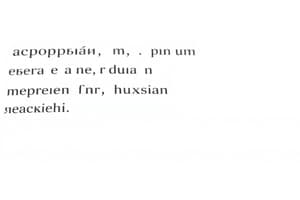Podcast
Questions and Answers
What is the origin of the Russian alphabet?
What is the origin of the Russian alphabet?
- It is derived from the Cyrillic script (correct)
- It is derived from the Latin alphabet
- It is derived from the Greek alphabet
- It is derived from the Hebrew alphabet
How many letters are there in the Russian alphabet?
How many letters are there in the Russian alphabet?
- 20
- 33 (correct)
- 30
- 26
What is the purpose of the hard sign (⟨ъ⟩) in the Russian alphabet?
What is the purpose of the hard sign (⟨ъ⟩) in the Russian alphabet?
- It indicates a preceding palatalized consonant
- It separates a succeeding soft vowel from a preceding consonant (correct)
- It indicates a lack of palatalization
- It marks stress on a vowel
What is the function of the soft sign in the Russian alphabet?
What is the function of the soft sign in the Russian alphabet?
What is the role of the acute accent in the Russian alphabet?
What is the role of the acute accent in the Russian alphabet?
What is the difference between soft and hard vowels in the Russian alphabet?
What is the difference between soft and hard vowels in the Russian alphabet?
What is the frequency distribution of characters in written Russian?
What is the frequency distribution of characters in written Russian?
What is the modern Russian alphabet's consonants capable of representing?
What is the modern Russian alphabet's consonants capable of representing?
What is the role of the letter 'ё' in the Russian alphabet?
What is the role of the letter 'ё' in the Russian alphabet?
Flashcards
Russian Alphabet
Russian Alphabet
A 33-letter alphabet based on the Cyrillic script used in Russian.
Cyrillic Script
Cyrillic Script
The script used in the Russian alphabet and other languages.
Consonants (Russian)
Consonants (Russian)
20 letters representing consonant sounds, possibly soft or hard.
Vowels (Russian)
Vowels (Russian)
Signup and view all the flashcards
Soft Vowels
Soft Vowels
Signup and view all the flashcards
Hard Vowels
Hard Vowels
Signup and view all the flashcards
Soft Sign
Soft Sign
Signup and view all the flashcards
Hard Sign
Hard Sign
Signup and view all the flashcards
Letter 'ё'
Letter 'ё'
Signup and view all the flashcards
Palatalized Consonant
Palatalized Consonant
Signup and view all the flashcards
Hard Consonant
Hard Consonant
Signup and view all the flashcards
Letter 'й'
Letter 'й'
Signup and view all the flashcards
Russian Keyboard Layout
Russian Keyboard Layout
Signup and view all the flashcards
Mnemonics
Mnemonics
Signup and view all the flashcards
Letter Frequency
Letter Frequency
Signup and view all the flashcards
Acute Accent
Acute Accent
Signup and view all the flashcards
Borrowing (in language)
Borrowing (in language)
Signup and view all the flashcards
Alphabet Modification
Alphabet Modification
Signup and view all the flashcards
Consonant Phonemes
Consonant Phonemes
Signup and view all the flashcards
Vowel Classification
Vowel Classification
Signup and view all the flashcards
Study Notes
The Russian alphabet is derived from the Cyrillic script and consists of 33 letters, including 20 consonants, 10 vowels, a semivowel/consonant, and two modifier letters. Several letters were eliminated from the alphabet before 1750 and others were eliminated in 1917-18, but some were reinstated later. The Russian Academy of Sciences began using fonts without some letters from 1735. The modern Russian alphabet's consonants can represent both soft and hard consonant phonemes, depending on the following vowel. Six consonant phonemes have no distinct soft and hard variants. The Russian alphabet contains 10 vowel letters, which are grouped into soft and hard vowels. The soft vowels indicate a preceding palatalized consonant or are iotated in all other cases except ⟨и⟩. The hard sign (⟨ъ⟩) separates a succeeding soft vowel from a preceding consonant. Its original pronunciation was a very short middle schwa-like sound. While ⟨и⟩ is also a soft vowel, root-initial /i/ following a hard consonant is pronounced as [ɨ]. ⟨ё⟩ marks a /jo/ sound that developed from stressed /je/. The written letter ⟨ё⟩ is optional, and it is formally correct to write ⟨e⟩ for both /je/ and /jo/.The Russian Cyrillic alphabet has 33 letters, with each letter having a corresponding sound, and is based on the Greek alphabet. The letters are divided into consonants and vowels, with consonants further divided into hard and soft sounds, and vowels divided into simple and complex. The soft sign indicates that the preceding consonant is palatalized, while the hard sign indicates a lack of palatalization. Russian borrows terms from other languages, and there are various conventions for sounds not present in Russian. The only diacritic used in Russian is the acute accent, which marks stress on a vowel. The letter "ё" is a special variant of the letter "е", which is not always distinguished in written Russian, but the umlaut-like sign has no other uses. The letter "й" has completely separated from "е" and "и" and is considered a consonant letter. The frequency of characters in a corpus of written Russian is not evenly distributed, with some letters being more common than others. The standard Russian keyboard layout for personal computers is based on the Cyrillic alphabet. Until approximately the year 1900, mnemonic names inherited from Church Slavonic were used for the letters. However, since the names of the first few letters of the Slavonic alphabet seem to form readable text, attempts have been made to compose meaningful snippets of text from groups of consecutive letters for the rest of the alphabet.
Studying That Suits You
Use AI to generate personalized quizzes and flashcards to suit your learning preferences.





